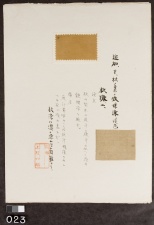Difference between revisions of "Sugi (Japanese Red Cedar) - top (23 T)"
Jump to navigation
Jump to search
(username removed) |
(username removed) |
||
| Line 5: | Line 5: | ||
| 23 | | 23 | ||
|- | |- | ||
| − | ! scope="row"| | + | ! scope="row"|Uemura number / title |
| − | | | + | | ; "Haze-some 25" |
|- | |- | ||
! scope="row"|Folder location | ! scope="row"|Folder location | ||
| Line 44: | Line 44: | ||
| ash water | | ash water | ||
|- | |- | ||
| − | ! scope="row"| | + | ! scope="row"|Uemura's notes |
| It was difficult to achieve the deeper depth of shade. Mordanting only with ash water would not let the dye compound absorb and fix to the fibers. | | It was difficult to achieve the deeper depth of shade. Mordanting only with ash water would not let the dye compound absorb and fix to the fibers. | ||
|- | |- | ||
| − | ! scope="row"| | + | ! scope="row"|Uemura's date |
| Kyoto | | Kyoto | ||
|} | |} | ||
| − | [[Category: | + | [[Category:Uemura dye archive]] |
Revision as of 07:16, 24 July 2013
| Museum number | 23 |
|---|---|
| Uemura number / title | ; "Haze-some 25" |
| Folder location | 1st shelf |
| Sample location | top (23 T) |
| Fiber type | cotton |
| Color | light brown |
| Dyestuff (Japanese common name) | 杦 : Sugi |
| Dye (English common name) | Japanese Red Cedar |
| Dyestuff (botanical name) | Cryptomeria japonica (L.f.) D.Don |
| Plant part | tree /dried |
| Dyestuff extraction | boiled in water |
| Auxiliary agent in dye bath | - |
| Mordant | iron |
| Other auxiliary agent | ash water |
| Uemura's notes | It was difficult to achieve the deeper depth of shade. Mordanting only with ash water would not let the dye compound absorb and fix to the fibers. |
| Uemura's date | Kyoto |
